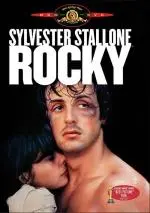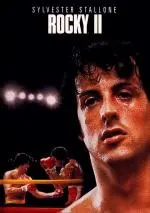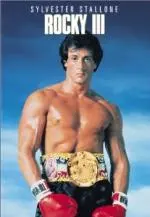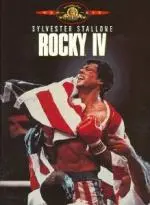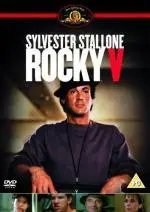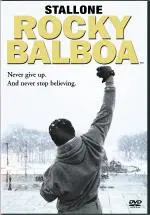image: Welch, Scott D.
Rocky movies inspire me to all sorts of new heights. A pair of good headphones and "Hearts On Fire" from the Rocky IV soundtrack? All it takes to push me to the threshold of human endurance...on a low-impact elliptical trainer while Reba reruns play on a gym's mounted television. But hey, we all have our own mountains to climb.
I want to share with you my Rocky movies, the way I see them. These stories always push me, whether I am writing, making art, or straining a hamstring in embarrassing fashion.
Here are six pieces of writing advice to take away from the six Rocky movies. May you eat lightning and write thunder!
![]() Rocky: The Distance
Rocky: The Distance
Rocky's a loser. Seriously. In the first movie, he's not a super-talented fighter at the top of his game. He's a washed-up thug who breaks legs for a loan shark. His slur is just this side of punch drunk. He's the worst at dating, this coming from a guy who picks date locations based solely on whether or not they have a Ms. Pac-Man machine.
Long story short, the first movie is about Rocky being set up to fight the current champ, Apollo Creed. Rocky doesn't stand a chance.
The movie is packed with famous scenes. The training montage, the running up the steps, the big fight at the finish. All great, but none quite as good as a quiet scene between Rocky and his girlfriend Adrian.
Alone in a bedroom, Rocky talks to Adrian in a voice so quiet you almost can't hear him. They're on a small bed together, Rocky the little spoon:
Rocky: I can't do it.
Adrian: What?
Rocky: I can't beat him.
Adrian: Apollo?
Rocky: Yeah. I been out there walkin' around, thinkin'. I mean, who am I kiddin'? I ain't even in the guy's league.
Adrian: What are we gonna do?
Rocky: I don't know.
Adrian: You worked so hard.
Rocky: Yeah, that don't matter. 'Cause I was nobody before.
Adrian: Don't say that.
Rocky: Ah come on, Adrian, it's true. I was nobody. But that don't matter either, you know? 'Cause I was thinkin', it really don't matter if I lose this fight. It really don't matter if this guy opens my head, either. 'Cause all I wanna do is go the distance. Nobody's ever gone the distance with Creed, and if I can go that distance, you see, and that bell rings and I'm still standin', I'm gonna know for the first time in my life, see, that I weren't just another bum from the neighborhood.
A writer's got to have goals, but those goals don't have to be the next Great American Novel or construction of a 40-book series. They can be about going the distance, whatever that is for you. Writing 50,000 words this year. Writing 5,000 words this year. Writing 5 words today. For Rocky, finishing the fight was the goal. Pick what, for you, represents The Distance. Then, whatever your Distance is, do it.
![]() Rocky II: The Imperfect
Rocky II: The Imperfect
If you asked whether a Stallone movie could bring me to tears, I would say No. If you then asked whether a sequel to a Stallone movie ever left me outright bawling, I'd remember Rocky II, apologize for lying, and excuse myself from the room for a polite but masculine weeping session.
Oh, that scene where Rocky proposes to Adrian at the zoo!
We all like to imagine what we'll say during big life events. Graduations, funerals. Maybe on the occasion that one man's humble dream comes true and someone names a Gravitron after him. We always want the right words when something big happens.
In Rocky II, Rocky's proposal to Adrian is less than polished:
I was wonderin' if, uh, you wouldn't mind marryin' me very much.
Not only are the words a bit wrong, but Adrian makes him repeat himself. He has to say that jagged, unsure, scared sentence twice.
That uncomfortable, imperfect proposal, it's perfect.
In Tom Spanbauer's workshop, he said "character lies in the destruction of the sentence." What that means, to me, is this: the way a boxer's mangled nose becomes the character of his face, Rocky's mangled words become his character.
Don't be afraid to say it wrong. Don't be afraid to use the words that feel right in your gut, even if they'd kill your English teachers. Don't be afraid that if your characters talk rough, we'll think you're an uneducated oaf. Those twisted words are your words, and your words are the right words to tell your story.
![]() Rocky III: The Fear
Rocky III: The Fear
Rocky III sits in an odd position between II and IV. II is the sequel that showed everyone the Italian Stallion wasn't a one-hit (to the face) wonder. IV is a movie ever off the rails. III is often forgotten between its bookends, but it's got a lot to say about fear.
In a key scene that drives the movie, Rocky's trainer, Mickey, confesses that all of Rocky's title defense matches were fought against handpicked opponents. Palookas. Jobbers. Tomato cans. Other boxing terms for people who are not very good at boxing. All the matches were setups.
All this time, turns out Rocky wasn't fighting at his level. When he finds out, his confidence is blown.
As a writer, it can get easy to dodge your harshest critic, the person you dread because his or her advice always sends you back to drafting.
Just the way Rocky had to beat Clubber Lang and earn confidence, your toughest critic will give you confidence. They'll make you less afraid. When your tough critics believe you're not a bum, that voice in your head that's always saying you're a bum gets quieter.
When the time comes, when you're ready to step up to a microphone or seal a manuscript in an envelope, you'll be glad you've been fighting the toughest there is.
![]() Rocky IV: The Fun
Rocky IV: The Fun
Rocky IV is the wildest movie in the series. James Brown shows up. The Balboas own a robot. Oh, and Rocky pretty much solves the Cold War with punches. It's a bag of mixed nuts, and yet it's the highest-grossing of all the films.
It could be the steely Dolph Lundgren's menace that brought people into the seats. It could be that audiences wanted to watch a small American underdog punch down the Iron Curtain. It could be the robot. If Short Circuit's Johnny 5 taught us anything, it's that we should never underestimate a 1980's movie robot.
My personal theory, however, is that people like Rocky IV because it's fun.
In terms of spectacle, in terms of scope, in terms of pure scene-by-scene enjoyment, the fourth movie is tops. Cheesy, but a damn good ride.
It's not always fun to write. Sometimes it's downright misery. But if you can find a way to have some fun with it, there's a good chance your reader will have some fun too. Don't be afraid that your reader won't follow you if you're usually dark and this time you're funny. They might be ready to take a breath too.
And hey, it's just one man's opinion, but an ill-placed 1980's robot never turned me off.
![]() Rocky V: The Flop
Rocky V: The Flop
There are plenty of reasons Rocky V flopped. People tire of characters. The cultural landscape can change. Oh, and casting athletes in lead roles is always risky. See Kazaam. "See" as in "reference", not as in "view." Please do not VIEW Kazaam under any circumstances.
In what's no doubt the fifth movie's best scene, Rocky breaks into Mickey's old gym and flashes back on some words of wisdom:
You know kid, I know how you feel about this fight that's comin' up. 'Cause I was young once, too. And I'll tell you somethin'. Well, if you wasn't here I probably wouldn't be alive today. The fact that you're here and doin' as well as you're doin' gives me—what do you call it—motivization? Huh? To stay alive, 'cause I think that people die sometimes when they don't wanna live no more.
The whole mentoring thing doesn't work out so well for Rocky. By which I mean he ends up in a bare knuckle street fight with his student.
Helping out another writer CAN help you, though. Working with writers and writing can be a rewarding experience that improves your work too. Share your skills. Work with young writers. Volunteer some time to help with a convention in your area.
Yeah, you might not be the greatest. That's okay. You don't need to be the greatest. You just need to know a little more than one other person.
Training Rocky kept Mickey going. Working with another writer can keep you going. Oh, and good news, the chances of your writing relationship ending in a bare knuckle street brawl are reasonably low.
![]() Rocky Balboa: The Cleanse
Rocky Balboa: The Cleanse
This final installment is packed with tender moments and wall-to-wall Rocky speeches. While the previous movies saw one or two marble-mouthed monologues, this one is jammed with Rocky dealing out advice to his son, his friends, members of a board of some kind. You get to wondering whether he waxes on to the mailman about how life's like dis and dat.
Just like the fighter he plays, Stallone had "some stuff in the basement" by the time he wrote Rocky Balboa. All of it, all those speeches and scenes, he got them out of the basement and onto the screen. While you watch, you get the idea that everything Stallone wanted Rocky to do, he did it in Rocky Balboa.
Stallone was lucky. After Rocky V's bad performance, Rocky Balboa almost never happened.
If you've got an idea, don't save it for your next project. Or for an unnamed project down the road. Don't save stuff in the basement. It may never see the light of day. You might not be as lucky as Stallone.
I'm not suggesting you cram every idea you've ever had into one book. I'm saying, make sure you're not starving your current work to feed a future that may never come. Don't worry that you won't have enough ideas for your next book. Write this one and it'll ensure the one to come.
When you look at Rocky as a series, the character parallels Stallone as a writer. In Rocky an underdog gets his one big shot and nails it. In Rocky II he proves he wasn't a fluke. Rocky III is a commentary on the way a successful person has to prove success over and over. Rocky IV is about bringing something small onto a big stage. Rocky V was the lesson, what happens when you aren't invested in what you're doing. Rocky Balboa was about whether or not he still had it.
As much as Rocky is the story of throwing punches, it's the story of anyone trying to do something that maybe they weren't meant for, something that they'll never be the best at. The movies will never be the pinnacle of cinema, their writer will never be considered a poet, and god help me, there's only so much 1980's robot novelty I can excuse. That said, it's in their imperfections, in their struggles, and in the way they give us the one hero who will never quit, that these movies push my heart through a few extra beats every time.
As a final spur to all the writers out there, the words of Rocky Balboa to his son:
The world ain't all sunshine and rainbows. It's a very mean and nasty place and I don't care how tough you are it will beat you to your knees and keep you there permanently if you let it. You, me, or nobody is gonna hit as hard as life. But it ain't about how hard you hit. It's about how hard you can get hit and keep moving forward. How much you can take and keep moving forward. That's how winning is done! Now if you know what you're worth then go out and get what you're worth. But ya gotta be willing to take the hits, and not pointing fingers saying you ain't where you wanna be because of him, or her, or anybody! Cowards do that and that ain't you! You're better than that!

About the author
Peter Derk lives, writes, and works in Colorado. Buy him a drink and he'll talk books all day. Buy him two and he'll be happy to tell you about the horrors of being responsible for a public restroom.
